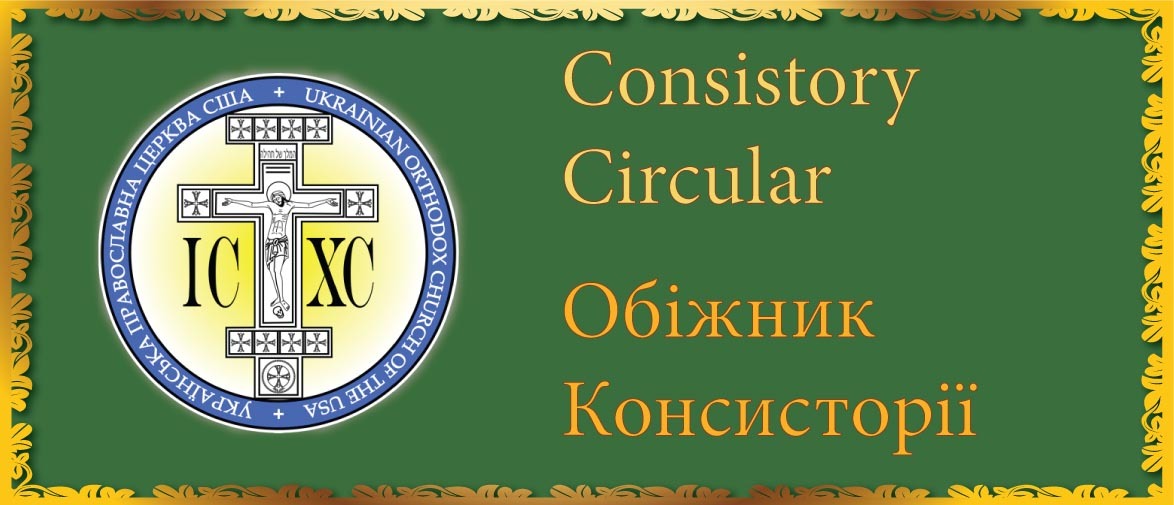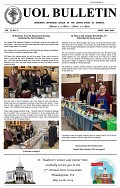Dear Brothers and Sisters in Christ!
In today's Gospel lesson we heard the parable about the young son who got tired of his father's surveillance and asked for his portion of the inheritance. After receiving it, he went away into another country where he lived prodigally and spent all his riches.
Soon there was famine and the young son did not have anything to eat. He came to his senses and decided to return to his father and ask for forgiveness. The father sees him coming from afar, clothed in rags and weak, is filled with compassion and runs out to meet him, falls on his neck and kisses him. As St. John Chrysostom reminds us, the father did not wish even to reproach his son for his shameful past, because he saw before him a son who had been dead and was alive again, who was lost and was found. The loving father, with great joy, ran out to meet his son, forgave him and reinstated him in sonship. In honor of his return, the father ordered the fatted calf to be killed and everyone feasted and rejoiced.
The parable is concerned with God's great love for man, particularly for the sinner and the joy which Heaven knows when sinners find spiritual regeneration.
As we heard in today's Gospel also that the elder son, who was working in the field at the time when his brother returned, regarded the whole situation differently. After he learned from the servant about the jubilation going on in the house, the elder son would not even enter the house. In the heart of the elder son there was neither love not even sympathy for his fallen brother, who was in need of support. He did not have love or respect for his father either. His heart was full of malice and pride. The father countered the malice and pride of his elder son with patient, paternally tender love. “As for your attitude to your brother: It was right that we should make merry and be glad, for your brother was dead and is alive again, and was lost and is found (Luke 15:32).” The father did not denounce or reproach his son, but again reasoned with him with paternal tenderness saying that he must love his brother, even though fallen.
Let us learn from the repentance of the prodigal son, who was able lift himself from moral downfall. Let us cast away the egoistic pride and malice of the older brother. Let us distance away from thought that we are sinless.
Here, brothers and sister, is an amazing struggle between love and egoistic pride. What does it teaches us? There are many amongst us who are like the elder son. Outwardly they fulfill God's commandments and observe ecclesiastical and social customs, try to avoid everything that violates established regulations, and for this they are considered good Christians. But their hearts are full of pride and egoism and are often hard as stone and cold as ice. Not having any obvious vices, they think highly of themselves and speak proudly of their merits. Pride and egoism deaden their love for God and for their neighbor. They expect rewards from God for their merits, and are envious and indignant if the Lord bestows His benevolence not upon them, but upon others whom they consider sinners worse than themselves.
Dear Brothers and Sisters none of us are sinless. Therefore let us be kind towards our sinful younger brothers and sisters. Let us rejoice and be glad that they have repented of their sinful ways. Let us imitate them in their repentance; this is what the Gospel parable about the father and his two sons teaches us. In the time of Great Lent, which is approaching soon, when we come to the holy confession, let us pray with the words of today’s Tropar: “Having foolishly abandoned Your paternal glory, I have squandered on vices the wealth that You have given me. Therefore, with the voice of prodigal I cry out to You: I have sinned before You, O Compassionate Father, accept me in repentance and make me as one of Your hired servants. Amen.
НЕДІЛЯ БЛУДНОГО СИНА
Луки 15, 11-32
Дорогі Брати і Сестри у Хресті!
Сьогодні ми чули у святому Євангелії притчу про блудного сина, який не захотів більше жити під наглядом свого батька і попросив дати йому частину його спадщини. Взявши своє майно цей син пішов в іншу країну і в скорому часі розтратив своє майно, живучі розпусно.
В скорому часі настав голод в тій країні і цей син не мав нічого їсти. Він схаменувся і вирішив вернутись до свого батька, кажучи сам до себе “Скільки наймитів у батька мого мають достаньо хліба, а я гину з голоду” (Луки 15:17). Коли цей син повертався додому, його батько побачив його здалека і йому стало жалко свого сина. Він зустрів його одягненого в подерту одежу, кинувся йому на шию і поцілував його. Св. Іван Золотоустий нагадує нам, що батько не хотів навіть докоряти свойому синові за його поведінку. Це тому, що батько побачив свого сина який помер і знову ожив, який загубився і знайшовся знову. Люблячий батько з великою радістю, побіг і зустрів свого сина, пробачив його провини і відновив його в правах сина. В честь його повороту, батько наказав своїм слугам заколоти годоване теля і всі раділи і веселилася.
Ця притча нагадує нам велику любов Бога до людини, а особливо до грішника і радість в Небі коли грішник знаходить духовне відродження.
Ми також чули в сьогоднішнім Євангелії про старшого сина, який працював в полі коли його молодший брат вернувся додому. Йому дуже не сподобалось радісне прийняття в домі для його молодшого брата. Він навіть не захотів зайти до хати. В серці старшого брата не було ні любові ні навіть співчуття для його повернувшого брата, який в той час потребував підтримки. Старший брат в своїм серці також не мав ні любові ні поваги до свого батька. Його серце було наповнене злобою і гордістю. Батько на злість і неповагу свого старшого сина відповів терпеливістю і батьківською ніжною любов'ю.
“Веселитись та тішитись, що брат твій оцей був мертвий і ожив, згунув був, і знайшовся”(Луки 15:32). Батько не ганьбив свого старшого сина за його злобу до свого брата. Батько переконував старшого сина, що він повинен любити свого брата не зважаючи на його провини.
Повчімося ж покаяння у блудного сина, що встав після глибокого морального падіння. Полюбімо смирення, що спасло розпусного сина. Відкиньмо гордість, дух ворожнечі і нетерпимість його брата.
Дорогі брати і сестри, тут ми бачимо надзвичайну боротьбу між любов'ю і егоїстичною гордістю. Що ж ця притча вчить нас? Багато з нас поводяться в своєму житті як старший брат в цій притчі. З наружі ці люди додержуються заповідей Божих як також виконують церковні і соціальні приписи і уникають порушення законів. Вони уважаються добрими християнами. Але їхні серця є наповнені гордістю і егоїзмом і часто їх серця є холодні як лід. Не маючі помітних поганих прикмет, ці люди дуже високо про себе думають, вони є горді за свою гідність. Гордість і егоїзм омертвляють нашу любов до Бога і до наших ближніх.
Дорогі Брати і Сестри, ніхто з нас не є безгрішними. Ми мусимо бути зрозумілими до тих людей які провадять грішне, не християнське життя. Радіймо і веселимося коли вони каються і навертаються від своїх гріховних доріг. Наслідуймо їхнє навернення. В час Великого Посту, який наближається, приходячи до сповіді, молімось Богові словами кондака Неділі Блудного Сина — “Від Отцевої слави Твоєї віддалився я безумно, в безчесті змарнувавши багатство, яке Ти передав мені. Тим то голосом блудного взиваю до Тебе згрішив я перед Тобою, Отче Щедрий, прийми мене в покаянні і настанови мене в одного з наймитів Твоїх”. Амінь.
о.Юрій Базилевський
|
| |||||||||||||












